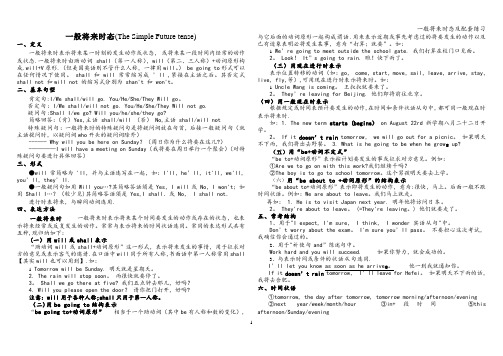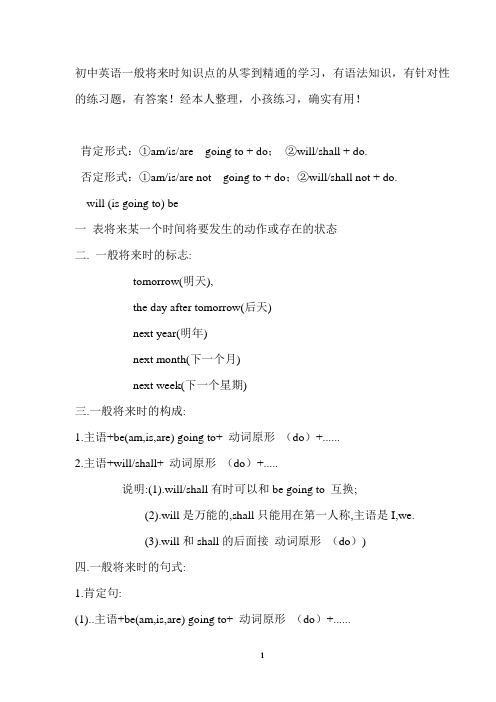一般将来时结构及练习
一般将来时讲解与练习

明天他们将去工厂参观。
我将和王兵、杨玲一起来。
Will you go to the zoo with me? Shall we go there at five?Will you please ope n the door?你和我一起去动物园好吗? 我们五点钟去那儿,好吗?请你把门打开,好吗?般将来时讲解与练习「、概念:一般将来时表示将来某个时间要发生的动作或存在的状态,及计划、打算或准备做某事。
常常与表示将来的时间状语连用。
如:tomorrow, n ext day(week, mon th, year …),soo n, the day after tomorrow (后天)等。
二、常用的表达形式共有五种,现归纳如下:(一)Will +动词原形”这一形式,主要用于在以下几个方面:1表示单纯的未来将要”通用于各个人称。
eg:They will go to visit the factory tomorrow.I 'lcome with Wang Bi ng and Yang Li ng.The rain will stop soo n. 雨很快就要停了。
2、表示不以人的意志为转移的自然发展的未来的事Today is Saturday. Tomorrow will be Sun day.He will be thirty years old this time next year.3、问对方是否愿意做某事或表示客气地邀请或命令eg: Will you please turn on the radio?注:在口语中will用于所有人称,书面语中第一人称常用shall(二)be going to +动词原形"的形式,表示事先经过考虑、安排好打算、计划要做的事情以及已有迹象表明必将发生某事,意为打算;就要”。
女口:1)We're going to meet outside the school gate. 我们打算在校门口见面。
一般将来时态及配套练习

一般将来时态及配套练习一般将来时态(The Simple Future tense)一、定义一般将来时表示将来某一时刻的发生动作或状态,或将来某一段时间内经常的动作或状态.一般将来时由助动词 shall(第一人称),will(第二、三人称)+动词原形构成.will+V原形.(但美国英语则不管什么人称,一律用will。
) be going to形式可以在任何情况下使用。
shall 和 will 常常缩写成’ll ,紧接在主语之后。
其否定式shall not 和will not 的缩写式分别为 shan't 和 won't。
二、基本句型肯定句:I/We shall/will go. You/He/She/They Will go。
否定句:I/We shall/will not go. You/He/She/They Will not go.疑问句:Shall I/we go? Will you/he/she/they go?简略回答:(肯)Yes,主语 shall/will (否) No,主语 shall/will not特殊疑问句:一般将来时的特殊疑问句是将疑问词放在句首,后接一般疑问句(就主语提问时,以疑问词who开头的疑问词除外)---—- Why will you be here on Sunday?(周日你为什么将要在这儿?)-————I will have a meeting on Sunday(我将要在周日举行一个聚会)(对特殊疑问句要进行具体回答)三、形式●will 常简略为 'll,并与主语连写在一起,如:I'll,he’ll,it'll,we'll,you’ll,they’ll.●一般疑问句如用W ill you…?其简略答语须是Yes,I will或 No,I won't;如用Shall I…?(较少见)其简略答语须是 Yes,I shall.或 No, I shall not.进行时表将来,与瞬间动词连用.四、表达方法一般将来时一般将来时表示将来某个时间要发生的动作或存在的状态,也表示将来经常或反复发生的动作。
be动词的一般将来时及练习题

be动词的一般将来时及练习题一、引言在英语语法中,一般将来时(Simple Future Tense)是用于表示将来发生的动作、事件或状态的时态。
而在一般将来时中,be动词(am、is、are)也有相应的变化形式。
本文将介绍be动词在一般将来时的用法,并提供一些练习题帮助读者巩固知识。
二、be动词的一般将来时用法1. 肯定句结构:主语 + will be + 表示状态的形容词/名词/副词/介词短语例如:- I will be happy tomorrow.(我明天会很开心。
)- She will be in London next week.(下周她将在伦敦。
)2. 否定句结构:主语 + will not be + 表示状态的形容词/名词/副词/介词短语(或缩写:won't be)例如:- They won't be tired after the trip.(旅行后他们不会疲惫。
)- He won't be at home tonight.(今晚他将不在家。
)3. 疑问句结构:Will + 主语 + be + 表示状态的形容词/名词/副词/介词短语?例如:- Will you be ready for the exam?(你会准备好考试吗?)- Will it be difficult to find a parking spot?(找个停车位会困难吗?)三、练习题根据所学内容,完成以下练习题。
1. 将下列句子改写为一般将来时:- I am tired today.(改写为将来时)答案:I will be tired tomorrow.- They are in school now.(改写为将来时)答案:They will be in school later.2. 根据所给的动词和主语构建一般将来时的肯定句和否定句:- I / study肯定句:I will study.否定句:I will not study. 或 I won't study.- You / be / late肯定句:You will be late.否定句:You will not be late. 或 You won't be late.- He / play / basketball肯定句:He will play basketball.否定句:He will not play basketball. 或 He won't play basketball.3. 根据所给的主题,完成下列疑问句的构建:- We / watch / movie疑问句:Will we watch a movie?- The weather / be / nice tomorrow疑问句:Will the weather be nice tomorrow?- They / go / shopping in the afternoon疑问句:Will they go shopping in the afternoon?四、总结通过本文,我们了解到be动词在一般将来时中的用法,并通过练习题加深了对该时态的理解。
一般将来时(知识梳理+真题+练习)

一般将来时(知识梳理+真题+练习)知识梳理1、定义:表示将要发生的动作或存在的状态,以及打算,计划或准备某事,句中一般含有表示将2、构成:①be going to+动词原形如:Iam going to see a Beijing opera tomorrow.We are going to meet at bus stop at half past ten.Dad and I are going to see a Beijing opera this afternoon.②will+动词原形如:They will go swimming this afternoon.3:be going to和will区别:①be going to表示经过事先安排,打算和决定要做的事情,基本上一定会发生;will则表示有可能去做,但不一定发生,也常表示说话人的临时决定。
②be going to表示近期或眼下就要发生的事情;will表示将来的时间则较远一些。
如:He is going to write a letter tomorrow.I will meet her one day.③be going to还可以用来表示有迹象表明某件事情将要发生,常用于天气等自然现象。
如:Look!It's going to rain.4、一般将来时句型转换:名校真题体验1.Li Yuan_____12 years old tomorrow.(长春市某中学招生入学考试真题)A. is going toB. will beC. isD. was解析:由tomorrow (明天)可知词句时态为一般将来时时,故选B2.Jack _________back home tomorrow.A. is going to beB. beC. was解析:由tomorrow (明天)可知词句时态为一般将来时时,故选A。
(济南市某重点中学入学试题)习题练习1.My aunt ________(come)back tomorrow . We are very excited .2.She will ________(visit) her uncle next week.3.What are you going________(do) there?4.They ________(plant) trees tomorrow.5.—________ Timmy ________(visit) his friends next Sunday? —Yes, he is.6.Tom ________ (go) to plant trees next day. He ________ (go) to plant trees every year.7.He________(visit) the farm next week.语法及练习6 将来时将来时一、概念:表示将要发生的动作或存在的状态及打算、计划或准备做某事。
一般将来时

练习: 1、我今天早上打算去公园。 I am going to the park this morning . I will go to the park this morning . 2、他 打算在下午做作业。 He is going to do homework this afternoon . He will do homework this afternoon . 3、他们打算下星期去旅行。 They are going to take a trip next week. They will take a trip next week.
3、主语+will+动词原形+其他。 例如:他今天晚上打算看电视。 He will watch TV tonight. He is going to watch TV tonight. Will =be going to
造句:她打算下星期踢足球。
She is going to play football next week. She will play football next week.
2、主语+ be (am\is\are) going to +地点+其他。
例如: 1、我打算今天晚上阅读杂志。 I am going to read a magazine this evening. 主语 be动词 动词原形 其他
2、他下个星期打算去北京。
He is going to Beijing next week. 主语 be动词 地点 其他
( ) 3. He ________ very busy this week, he ________ free next week. A. will be; is B. is; is C. will be; will be
一般将来时态及配套练习

一般将来时态(The Simple Future tense)一、定义一般将来时表示将来某一时刻的发生动作或状态,或将来某一段时间内经常的动作或状态。
一般将来时由助动词shall(第一人称),will(第二、三人称)+动词原形构成。
will+V原。
(但美国英语则不管什么人称,一律用will。
) be going to形式可以在任何情况下使用。
shall 和will 常常缩写成'll ,紧接在主语之后。
其否定式shall not 和will not 的缩写式分别为shan't 和won't。
二、基本句型肯定句:I/We shall/will go. You/He/She/They Will go.否定句:I/We shall/will not go. You/He/She/They Will not go.疑问句:Shall I/we go? Will you/he/she/they go?简略回答:(肯)Yes,主语shall/will (否) No,主语shall/will not特殊疑问句:一般将来时的特殊疑问句是将疑问词放在句首,后接一般疑问句(就主语提问时,以疑问词who开头的疑问词除外)----- why will you be here on Sunday?(周日你为什么将要在这儿?)-----I will have a meeting on Sunday(我将要在周日举行一个聚会)(对特殊疑问句要进行具体回答)三、形式●will 常简略为'll,并与主语连写在一起,如:I'll,he'll,it'll,we'll,you'll,they'll。
●一般疑问句如用will you…?其简略答语须是Yes,I will或No,I won't;如用Shall I…?(较少见)其简略答语须是Yes,I shall.或No,I shall not.进行时表将来,与瞬间动词连用。
(完整版)一般将来时初中语法

初中英语一般将来时知识点的从零到精通的学习,有语法知识,有针对性的练习题,有答案!经本人整理,小孩练习,确实有用!肯定形式:①am/is/are going to + do;②will/shall + do.否定形式:①am/is/are not going to + do;②will/shall not + do.will (is going to) be一表将来某一个时间将要发生的动作或存在的状态二. 一般将来时的标志:tomorrow(明天),the day after tomorrow(后天)next year(明年)next month(下一个月)next week(下一个星期)三.一般将来时的构成:1.主语+be(am,is,are) going to+ 动词原形(do)+......2.主语+will/shall+ 动词原形(do)+.....说明:(1).will/shall有时可以和be going to 互换;(2).will是万能的,shall只能用在第一人称,主语是I,we.(3).will和shall的后面接动词原形(do))四.一般将来时的句式:1.肯定句:(1)..主语+be(am,is,are) going to+ 动词原形(do)+......(2)..主语+will/shall+ 动词原形(do)+.....2.否定句:(1)..主语+be(am,is,are) not going to+ 动词原形(do)+......(2)..主语+will/shall not+ 动词原形(do)+.....3.一般疑问句:(1).Am/Is,Are+主语+going to+ 动词原形(do)+....(2).Will//shall+主语+ 动词原形(do)+...4.特殊疑问句:(1).What (Where, How...)+be (am,is,are)+主语+ going to + 动词原形(do)+...?(2). What (When,Where,How...) +will/shall+ 主语+ 动词原形(do)+...?二、基本结构:①be going to + do;②will+ do.三、否定句:在be动词(am, is, are)后加not或will后加not成won’t。
一般将来时讲解(附习题+答案)

一般将来时讲解(附习题+答案)一、一般将来时的含义:表示动作发生在将来二、一般将来时的句型:(1) will/shall+动词原形(2) be going to+动词原形三、一般将来时的时间状语:tomorrow(明天)、the day after tomorrow(后天)、next...(下一...): next week(下一周)、next year(明年)、next month(下个月)in+一段时间(...之后): in three days(三天之后)、in the future在未来this evening(今天晚上)四、一般将来时的句型结构:(1) will/shall+动词原形(will not =won’t)(will 各种人称均可用,shall 只能用于第一人称)1)肯定句:主语+will/shall+动词原型...如:I will go to school tomorrow.我明天将会去学校He will go to school tomorrow.他明天将会去学校。
2)否定句:主语+will/shall+not+动词原型...如:I won’t go to school tomorrow.我明天将不会去学校。
He won’t go to school tomorrow.他明天将不会去学校。
3)一般疑问句:Will/Shall +主语+动词原型...如:Will you go to school tomorrow?你明天要去学校吗?Will he go to school tomorrow?他明天要去学校吗?肯定回答:Yes, 主语+will.如:Yes, I will.Yes, he will.否定回答:No,主语+will+not.如:No, I won’t.No, he won’t.4) 特殊疑问句:特殊疑问词+will/shall+主语+动词原型...如:What will you do tomorrow?你明天将会做什么?What will he do tomorrow?他明天将会做什么?(2) be going to+动词原形1)肯定句:主语+be going to +动词原型...如:I am going to buy some books tomorrow.我明天打算去买一些书。
- 1、下载文档前请自行甄别文档内容的完整性,平台不提供额外的编辑、内容补充、找答案等附加服务。
- 2、"仅部分预览"的文档,不可在线预览部分如存在完整性等问题,可反馈申请退款(可完整预览的文档不适用该条件!)。
- 3、如文档侵犯您的权益,请联系客服反馈,我们会尽快为您处理(人工客服工作时间:9:00-18:30)。
一般将来时结构及专项练习
现在看将要发生的动作或存在的状态.
标志性词语:
tomorrow,soon,next year / week / month, in a few days, in the future, this afternoon, the day after tomorrow, one hour later, tomorrow morning
基本结构:(will/shall +do)
肯定式:主语+will/shall+动词原形+……
否定式:主语+will/shall+ not+动词原形+……
一般疑问式:Will/Shall+主语+动词原形+……
肯定回答:Yes, 主语+will/shall
否定回答: No, 主语+won’t/shan’t
特殊疑问句:特殊疑问词+will/shall+主语+动词原形+……
其他表将来时结构:
I. be going to+动词原形(表打算,预测) 表示现在的意图,即打算在最近或不久的将来做某事eg:We are going to ask him
表示现在已有迹象表明即将収生某事eg: Look, it is going to rain
II. 现在进行时(come, go, arrive, leave, start, move) 表示按计划或安排要发生的事eg: We’re having a party next week
课堂练习
1. There _______ a meeting tomorrow afternoon.
A. will be going to
B. will going to be
going to be D. will go to be
2. Mike _________here next month.
A. isn’t work
B. doesn’t working
C. isn’t going to working
D. won’t work
3. He _____very busy this week, he ______free next week.
A. is, will
B. will, is , will be ,is
4. Mother ___ me a nice present on my next birthday.
A. gives
B. are going to give
C. give
D. will give
5. He _______ her a beautiful hat on her next birthday.
A. gives
B. will giving going to give D. gave
6. He ___ in three days.
A. came back
B. will come back
going to coming back D. will coming back
7. The day after tomorrow, we ____ a football match.
A. will watch going to watch C. watches D. will watching
8. They ____ an English party next Sunday.
A. are going to have going to have C. will having D. having
9. ____ you _____ free next Monday
A. Are, be
B. Will, be
C. Do, be
D. Will, are
10. I _____ for Tibet next Wednesday.
leaving B. will leaving C. leaves going to leaving
句型转换
(1).The girls are going to take acting lessons.(改为否定句)
(2).The students have a school trip in spring.(用next week 改写)
(3).They are going to meet outside the school gate.(划线提问)
改错:找出每句中的错误,在题后改正
1. He will sing and dances for us tomorrow.
2. — Are you going to swim —Yes, I will.
3. He will help Jim with his English every day.
4. Will her sister sings a song for me tomorrow
5. They willn’t plant trees next week.
6. Are they going to plays basketball tomorrow
7. Will we going to visit the factory tomorrow
8. Paul will be going to make dumplings for Emma.
9. —Are the boys going to the Great Wall next month —Yes, they will.
综合训练
Jim is going to play football tomorrow.
否定句:
一般疑问句:
肯定/否定回答:
画线部分提问:Who is going to …
What is Jim going to do …
Mary will clean the windows next week.
否定句:
一般疑问句:
肯定/否定回答:
画线部分提问:
巩固提升
用所给动词的适当形式填空
1. I ______(leave)right now. I______(finish)my work before I leave.
2. How long ______ you ______(study)in our country
3. I ______(plan)to be here for about one more year.
4. I ______(hope)to visit the other parts of your country.
5. What ______you ______(do)after you leave here
6. I ______(return)home and ______(get)a job next year.
7. I ______(be)tired. I ______(go)to bed early tonight.
8. Mary's birthday is next Monday, her mother ______(give)her a present.
9. It is very cold these days. It ______(snow)soon.
10 —______you ______(be)here this Saturday
—No. I ______(visit)my teacher.
11. I am afraid there ______(be)a meeting this afternoon. I can't join you.
12. Mike won’t believe_____(believe, not)this until he sees it with his own eyes.
13. Most of us don't think their team __will win____(win).。
